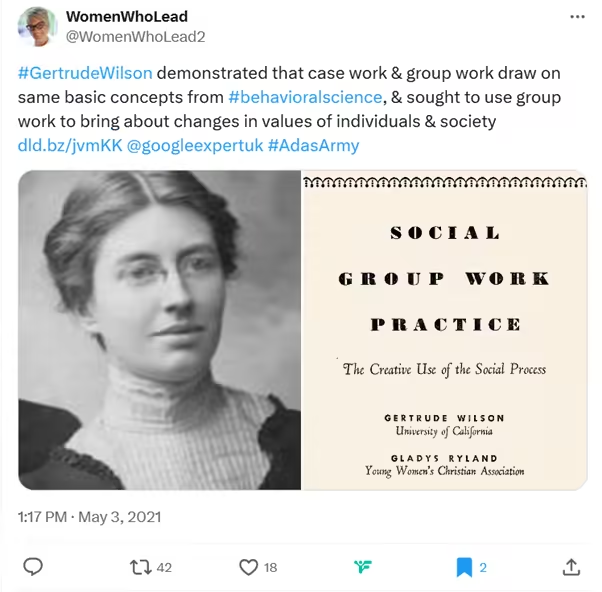A Groundbreaking Career
Gertrude Wilson was born in 1895. Gertrude was a visionary social worker whose innovative ideas and practical approaches have left an enduring legacy in the field of social group work. Her career was marked by a deep commitment to understanding and addressing social issues through the power of group interaction.
Key Contributions to Social Group Work
Gertrude Wilson contribution to social group work are multifaceted and have significantly shaped the field:
- Integrated Approach: She advocated for an integrated approach to social work, combining casework and group work methods. This holistic perspective recognized the importance of considering both individual and social factors in addressing human needs.
- The Social Process: Wilson highlighted the significance of the social process in group work. She explored how group dynamics, relationships, and interactions could be harnessed to facilitate positive change.
- Professional Education: Recognizing the need for skilled practitioners, Wilson played a crucial role in developing professional education programs for social workers. She emphasized the importance of acquiring the necessary skills and knowledge to effectively engage with groups.

A Deeper Dive into the Work of Gertrude Wilson
To further understand Wilson's impact, let's delve deeper into her key contributions to social group work:
- The Social Process in Group Work:
- Group Dynamics: Wilson emphasized the importance of understanding group dynamics, such as roles, norms, and power structures. To facilitate positive change within groups.
- Interpersonal Relationships: She highlighted the significance of interpersonal relationships within groups. Recognizing the potential for both positive and negative influences on individuals.
- Group Cohesion: Wilson explored the concept of group cohesion, or the sense of belonging and connection among group members, and its impact on individual and group outcomes.
- The Role of the Social Worker:
- Facilitator: Wilson viewed the social worker as a facilitator. Guiding and supporting group members in their development and problem-solving efforts.
- Observer: She emphasized the importance of the social worker as an observer. Paying attention to group dynamics and individual behaviors to identify potential issues and opportunities for intervention.
- Enabler: Wilson recognized the social worker's role in enabling group members to develop their skills and capacities. Empowering them to take action and create positive change.
- The Practice of Social Group Work:
- Group Formation: Wilson discussed the importance of careful group formation. Considering factors such as group size, composition, and purpose.
- Group Goals: She emphasized the need for clear and achievable group goals, which should be developed collaboratively with group members.
- Group Activities: Wilson explored a variety of group activities, including discussion, role-playing, and creative expression. To promote learning, skill development, and problem-solving.
- Evaluation: She advocated for ongoing evaluation of group work processes and outcomes. To assess the effectiveness of interventions and make necessary adjustments.
A Lasting Legacy
Gertrude Wilson's legacy continues to inspire social workers and educators around the world. Her groundbreaking work has shaped the field of social group work and remains relevant in contemporary practice. By understanding the principles and techniques she pioneered, practitioners can continue to empower individuals and communities. Through the power of group interaction.
Wilson's ideas continue to be influential in contemporary social work, particularly in areas such as:
- Community Development: Group work used to mobilize communities and address social issues.
- Youth Development: Group work provides young people with opportunities for social and emotional development.
- Mental Health: Group work used to support individuals with mental health challenges. Promoting recovery and resilience.
- Substance Abuse Treatment: Group work is a valuable component of substance abuse treatment programs. Fostering peer support and accountability.
By understanding and applying the principles and techniques pioneered by Gertrude Wilson, social workers can continue to make a positive difference in the lives of individuals and communities. Gertrude Wilson certainly had Adas Army spirit.
